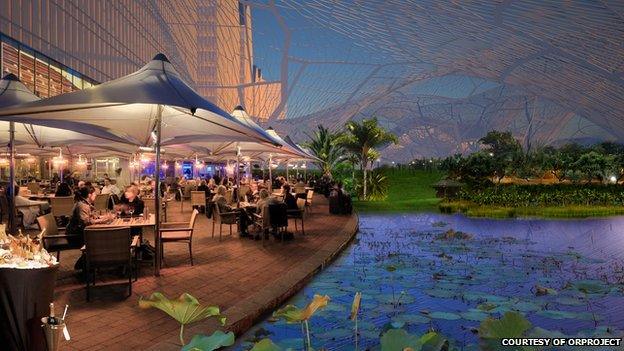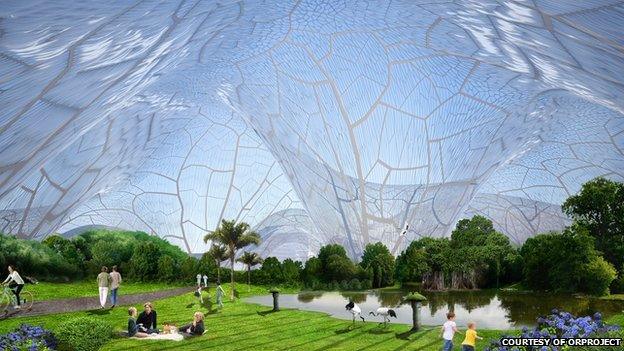China pollution: How air domes may help Beijing
- Published

A London-based architectural firm devised the idea for the "Bubbles" project
On most days, a thick blanket of poisonous smog hovers over Beijing. But one day, China's capital could be dotted with domes filled with clean air.
Orproject, a London-based architecture and design firm, has devised the Bubbles project, a design that envisions massive, balloon-like structures filled with clean air.
The vegetation inside the park would produce clean air for those living inside the buildings on the perimeter of the bubbles, while also providing a smog-free space for residents to spend time in the faux outdoors.
Rajat Sodhi, director of Orproject India, spent a year and a half developing the idea with the firm's Beijing team.
"The seed of this project was the realisation that in developing countries, especially major cities in India and China, the air quality has crossed unacceptable limits." Mr Sodhi explains.
"You really can't step out and be outdoors. You just move from one air-conditioned space to another."
The group decided to design the large domes using patterns found in nature.
"If you look at the structure of a butterfly wing or that of a leaf, it has a dense pattern that allows the structure to be fairly stable and fairly large but using very little material," Mr Sodhi says.

The large domes envisioned in the project draw inspiration from patterns found in nature
Mixed reactions
The skin of the rooftop bubbles would be created from ETFE, an extremely durable, lightweight material that will not decompose over time. Each bubble would be filled with gas, allowing it to float.
The entire structure would be shaped and anchored with steel supports.
The project has received mixed reactions since it was first released in January.
But critics argue that the concept smacks of defeatism. Why bother to rid the air of pollution in cities like Beijing if bubbles of clean air are available?
Others say the plan is simply unrealistic and, at best, would lead to two classes of citizens in polluted areas. Presumably only a wealthy few would gain access to the bubble, leaving the unlucky majority trapped in smog.
Rajat Sodhi believes the reaction comes from those who want to solve environmental problems, though he says that isn't his goal. He's an architect who creates living spaces, he contends. The Bubbles project could work in a variety of locations where people are barred from enjoying green, open spaces for much of the year.
.jpg)
The firm's designers say that the project is suitable for hot or cold climates
"You had a whole part of the US affected by the Polar Vortex this year, which made stepping outside impossible," he says. "There were basically no green areas in cities, so the air quality drops because there is no natural regeneration of the air."
This project could exist in extremely hot or cold climates, the designers contend.
"I think this kind of project was meant for any space, because what it fundamentally does is create a controlled environment in the form of a biodiversity park which can sustain clean air throughout the year," Mr Sodhi says.
Chinese government officials have yet to respond to the firm's proposal.